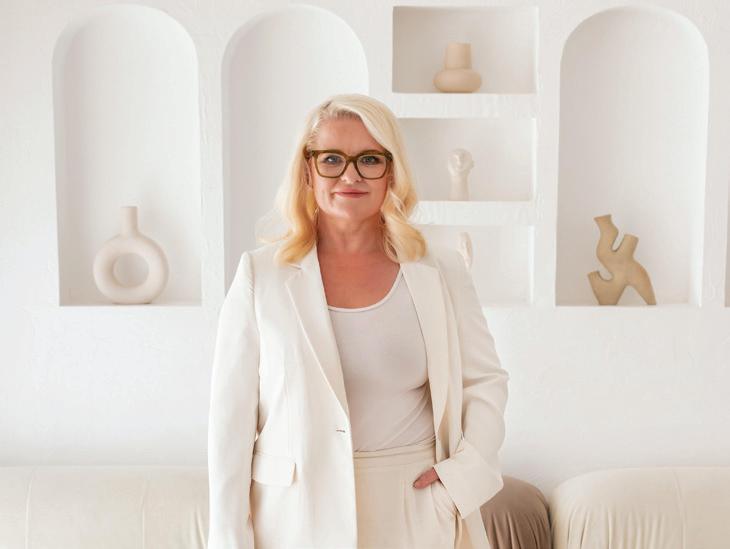
5 minute read
How The Economy Squashed the Beauty Industry Theory That “Education Sells.”
By Chrissy Alger
Start Up Businesses are hard work. Especially when you cannot do the work yourself. So, over the years I have had to learn all of the business strategies known to man to keep my business afloat and to stop myself from going bankrupt!
During COVID, my Melbourne based clinic was completely shut down. It was not an ‘economic downturn’ it was a complete elimination of my business operating as it had been. A complete pivot of the business meant that for the entire lockdown period we actually made more money than the comparable trade period before lockdown… Yep, I made MORE money…. CLOSED!!!
So, I know a little bit about downturn and doing biz in difficult economic climates, navigating market fluctuations and bullet proofing your business from less than ideal economic climates! So read on, and I’ll share some strategies that have been protecting my clients from the economic fluctuations. As the economy continues to challenge the beauty industry, many salon and clinic owners are finding themselves grappling with an undeniable truth: that clients have stopped buying…
In a world where clients are tightening their belts, consultations are often being met with nodding clients who leave without making a purchase. What I have found though, is that through some tweaks in the consultation method you cannot only have clients continuing to make purchases, but you can also have them investing at levels that are unprecedented!
EDUCATION ISN’T ENOUGH: WHY MOTIVATION MATTERS
For years, the beauty industry has been told that educating clients about the benefits of products and treatments is enough to make sales. The logic seemed sound—provide evidence-based solutions, explain the clinical reasons, and clients will naturally invest. However, as many salon and clinic owners are discovering, this is no longer the case.
But it actually never was the case, however as the economy constricted and disposable income became pressured, buying habits reduced. Clients that were not overly committed or invested- flaked. This unearthed the problem with solely relying on educational based consult, it didn’t foster enough client commitment.
Education alone doesn’t create commitment.
While education remains important, it only accounts for a small proportion of influencing a buying decision. The real driver of client engagement and commitment lies in understanding their motivation. Without tapping into that emotional and psychological space, you may deliver the best advice possible, only to see your client walk out without making a single purchase.
Understanding Client Commitment Levels
To move clients from mere interest to committed action, we need to dive deeper into their motivations. Most potential clients fall into what we call the “contemplation stage” —they’re curious, but not yet invested. They’ve seen an offer, clicked on your ad, and booked an appointment. But make no mistake— curiosity is not the same as commitment.
What’s missing? Motivation. To convert clients, we need to shift their mindset from contemplation to action, and that starts with asking the right questions during the consultation.
Shift To A Motivational Consultation Process
This is where the Motivational Consultation Method comes in. By incorporating elements of motivational interviewing into your consultation process, you can move clients from being interested in your services to fully committing to them.
Here’s how you can start integrating this process into your salon or clinic:
Ask the Right Questions: The goal is not to bombard clients with clinical information, but to ask open-ended questions that uncover their deeper needs. Focus on their motivations, capacity for financial investment, and the time they’re willing to commit. Instead of saying, “This is the best treatment for you,” ask, “Does this treatment plan suit what you can commit to right now?”
Understand Client Limitations: Tailor your recommendations based on what the client is willing and able to commit to. If a full treatment plan is overwhelming for them, provide options that fit their budget or schedule. Flexibility builds trust and increases the likelihood of client follow-through. They will end up spending more as a result of this flexibility.
Limit Over-Education: Clients don’t need to know every ingredient or scientific term in your treatment or home care plan. The education component of your consultation should be kept simple—focus on the “why”. Explain in layman’s terms how your recommendation ties directly to the client’s personal goals. For example, “We’re using this treatment because it will give you the glowing skin you want”. It’s as simple as that.
WHY THIS WORKS—EVEN IN A TOUGH ECONOMY
When clients feel understood and their limitations are acknowledged, they are more likely to stay committed, even when their financial situation is uncertain. This approach helped many salons and clinics weather economic storms, with some reporting their best numbers on record even during recessions.
By connecting with your clients on a deeper, more motivational level, you’re not just offering a service—you’re offering a partnership in their transformation journey. And that, in today’s climate, is priceless.
Chrissy Alger is the Founder of Freedom Mastery coaching for the Hair, Skin and Beauty Industry. She is a Salon Owner, Salon Marketer and Salon Coach having successfully run her own Salon business from start-up - NOT as a technician but purely as someone addicted to business. She is also a psychologist, who decided to do something different and venture into the salon industry space under the guise of wanting to do more to promote health, wellbeing and self- confidence.
If you need more help with implementing a consult method that sells, email me at @ chrissy@freedommastery.com.au for more details. Also check out my YouTube: Chrissy Alger Freedom Creator for more training and valuable content!
@chrissyalger_freedomcreator











